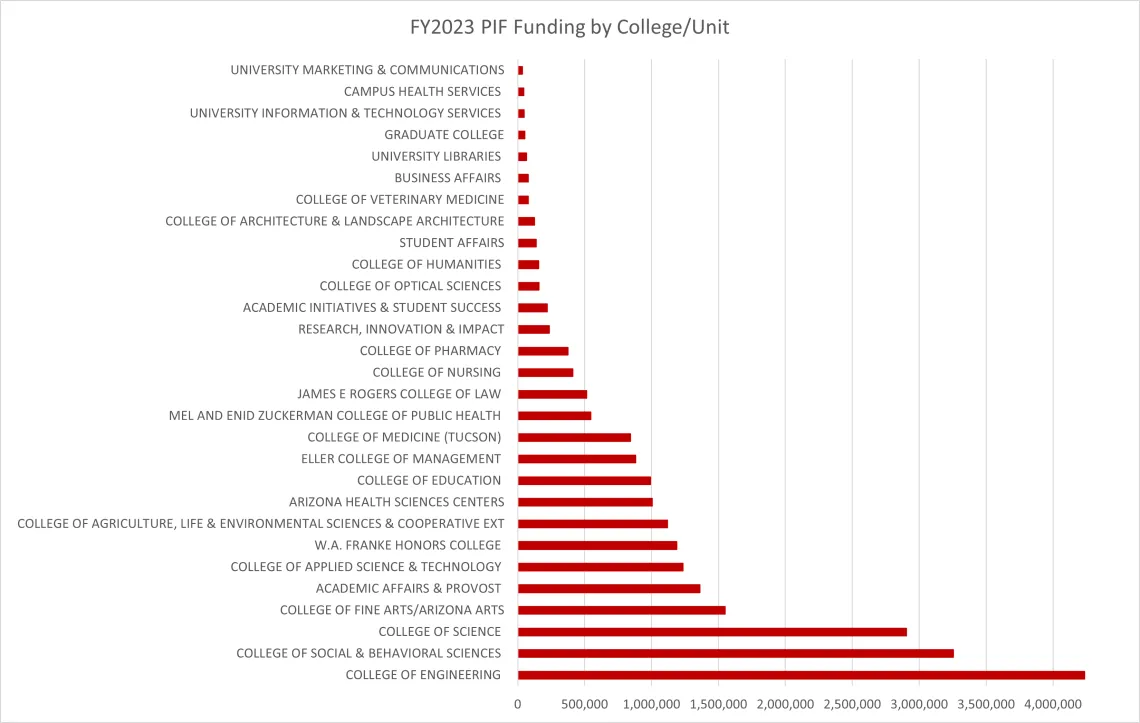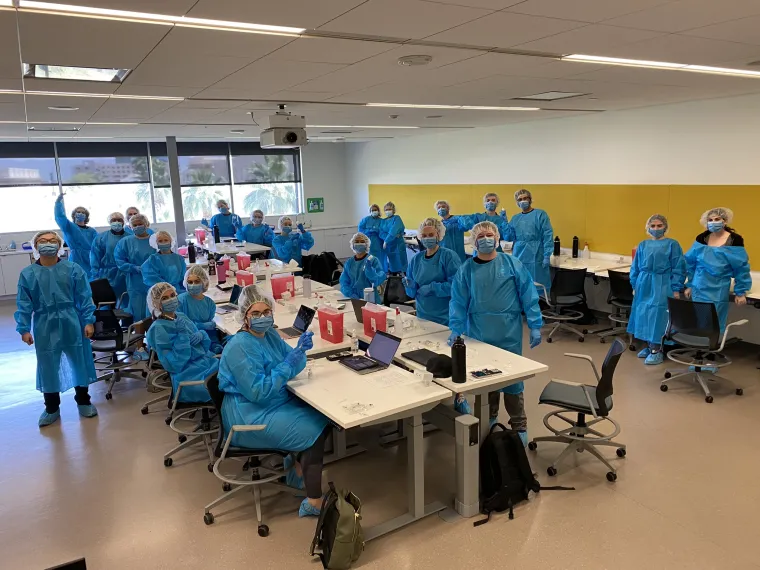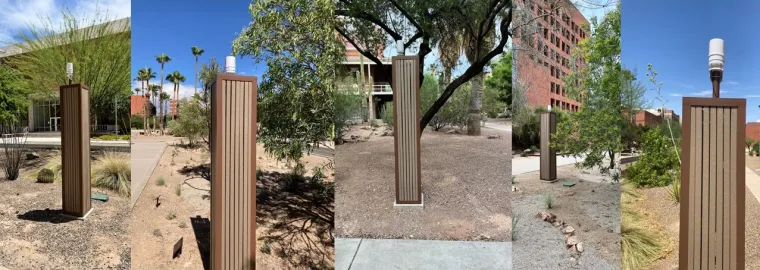FY2023 Provost’s Investment Fund Report
Updated 9:35 a.m. August 17, 2023
During Fiscal Year 2022-2023, the Office of the Provost received an allocation of $24,022,729 from the Activity Informed Budgeting (AIB) budget model to fund the Provost’s Investment Fund (PIF). A total of $23,867,752 was allocated to initiatives (see Table 1) and transferred from PIF to the colleges and units shown in the graph below.
Some examples of funding are strategic programs and initiatives that support instructional and academic activities such as the CAST Cybersecurity Research and Workforce Development Program in partnership with the Research, Innovation and Impact TRIF program; the School of Music’s initiative to provide access to musical instruments for their diverse student population, and Eller Microsoft Excel Collegiate Challenge. The PIF funding was also utilized to make some improvements to various research spaces; examples are renovating the clean room in the College of Engineering and the 4th floor renovation in the Cancer Center Building. Funding was also utilized for several instructional spaces such as the Pharmacy laboratory space in Phoenix Biomedical Campus and Campus Living Lab shown in the highlights section below.
The fund was also used for faculty initiatives: the Faculty Salary Equity Reviews and Strategic Priorities Faculty Initiatives (SPFI), which aims to provide funding support to departments to hire tenure-track faculty or continuing-track academic professionals who will enhance the university’s distinctive strengths in advancing Inclusive Excellence via equal opportunity, diversity, and inclusion as outlined in the University of Arizona’s Purpose and Values.
A total of $3,036,800 was allocated for strategic initiatives awarded through competitive submissions in the Fall 2022 cycle and Spring 2023 cycle (see Table 2).

| CATEGORY | AMOUNT | % |
|---|---|---|
| Instructional/Academic Support | 4,302,113 | 18.02% |
| Strategic Hiring Commitment/Start-up for Deans & Dept Heads | 3,963,759 | 16.61% |
| Facilities/Infrastructure for Research and Instruction | 3,425,808 | 14.35% |
| Faculty Salary Support | 2,713,405 | 11.37% |
| Faculty Partner Hires | 1,742,174 | 7.30% |
| Deans & Dept Heads Administrative Stipends | 1,536,134 | 6.44% |
| Strategic Priorities Faculty Initiative (SPFI) | 1,416,056 | 5.93% |
| New Academic/Student Program | 1,413,000 | 5.92% |
| Research Support | 971,643 | 4.07% |
| Student Support | 671,031 | 2.81% |
| Enterprise Systems | 630,000 | 2.64% |
| Provost's Discretionary Support | 301,500 | 1.26% |
| Regents Professors Salary Supports | 183,143 | 0.77% |
| Graduate Interdisciplinary Program (GIDP) Faculty Salary Support | 180,703 | 0.76% |
| Distinguished Professors | 151,047 | 0.63% |
| Faculty Awards | 108,285 | 0.45% |
| Faculty Retention | 92,356 | 0.39% |
| Shared Governance Support | 48,595 | 0.20% |
| Promotion & Tenure Committee | 17,000 | 0.07% |
| TOTAL | 23,867,752 | 100.00% |
| PIF Cycle | Amount |
|---|---|
| Fall 2022 | 1,464,200 |
| Spring 2023 | 1,572,600 |
| TOTAL | 3,036,800 |
Highlights
Reimagining Space on the Phoenix Bioscience Core (PBC) for Non-Sterile and Sterile Compounding Instruction – a Cornerstone of Pharmacy Education and Training, Career Path Development and Student Recruitment
The Reimagining Space on the Phoenix Bioscience Core [formerly Phoenix Biomedical Campus (PBC)] for Non-Sterile and Sterile Compounding Instruction – a Cornerstone of Pharmacy Education and Training, Career Path Development and Student Recruitment was a project in the Department of Pharmacy Practice and Science in the R. Ken Coit College of Pharmacy. This project enabled a scalable design for the newly available space to create a laboratory space with 26 workstations and equipment for individual student learning and non-sterile compounding skill development, an adjacent room for sterile compounding equipped with additional laminar flow hoods, and a separate storage area.

Photo provided by project team. RKCCOP P1 student pharmacists during lab section – April 2023
The PIF funding was utilized for the construction, and it completed on time and on budget from September-December 2022. The college also allocated some resources for furniture, fixtures, and equipment. Temporary technology needs were addressed by installing a new podium and computer in the space to allow for compounding lab instruction in Spring 2023, where PhPr 810 Pharmaceutics Product Preparation and Calculations, co-coordinated by Dr. Caitlin Cameron, was held. Three laboratory sections with 17 to 20 students per section were possible. Furthermore, new display, control, and video routing hardware have been installed for in-person instruction to enhance the learner experience.
The room renovations created a space appropriate for the additional pharmacy practice instruction and streamlined instructional preparation and setup for pharmacy faculty. This area is licensed as a ‘pharmacy’ by the Arizona Board of Pharmacy. The space advances instruction in this critical area of pharmacist skill development. Furthermore, recruitment and outreach extended to the College of Medicine–Phoenix Summer Scrubs program in the “The Health Care Team” segment of the program in Summer 2023. Summer Scrubs is a healthcare exploration program that enables current 9th- and 10th-grade students to participate. The faculty involved now have ample space to build out activities to showcase pharmacy as a possible healthcare occupation.
Vertically Integrated Projects (VIP): A Scalable, Cost‐Effective, Equitable Approach to Undergraduate Research and Creative Inquiry
The VIP program is a scalable, cost-effective, and equitable approach to engaging undergraduate and graduate students in research, creative inquiry, and service learning. In the VIP model, multidisciplinary teams align student efforts with faculty research priorities in long-term, large-scale projects. Students can participate for credit or pay. This highly successful model has been rigorously evaluated and refined nationally for more than two decades, resulting in positive outcomes in student retention, self-efficacy, increased participation in research by students that are underrepresented in higher education, and other critical metrics.
With funding awarded from the Provost’s Investment Fund for January 2022 through June 2023, VIP at the University of Arizona proposed to (1) establish dedicated, centralized program administration; (2) further integrate VIP into the University’s undergraduate research ecosystem; (3) grow the number and diversity of active teams and enrolled students; (4) formally assess VIP’s efficacy in student attainment and faculty research outcomes; and (5) enable faculty to create VIP project teams based on their interest and areas of expertise, leveraging the student workforce to produce early research results that can be used to generate larger, externally funded research proposals.

Photo provided by project team. VIP Students in various VIP Teams
Program initiatives to support these objectives included the recruitment of a Faculty Director and Program Coordinator; the promotion of broader and more diverse student participation through the Federal Work-Study program: the offering of two faculty development opportunities; and the implementation of program assessment practices to guide future program improvements and educational research.
Overall, the proposed activities were all accomplished by the completion of the award period, and the full amount of the PIF award was spent. The VIP program has successfully transitioned to a centrally supported program and is one of the flagship undergraduate research programs on campus.
One student who participated in the program said “I can confidently say that [the VIP class] has had a significant impact on how I view myself as a scientist and how I engage with my science curriculum at UA. Before taking this class, I was hesitant to identify as a scientist, as I felt that I did not have the necessary skills or knowledge to do so. However, this class has taught me that science is not just about having all the answers, but rather about the process of inquiry and problem-solving. Through the assignments, discussions, and labs, I have gained confidence in my abilities as a scientist and have been inspired to pursue further scientific exploration.”
Early Math Placement Outreach
The Department of Mathematics, Schedule for Success, Think Tank, Wildcat Leap, New Start, and Admissions/Recruitment worked collaboratively on early math placement outreach for first-year students, with the goal being to provide opportunities for students to be better prepared for their fall math course and through these efforts, reduce the population of students taking Math 100. The early math placement outreach efforts for the Fall 2023 first-year student cohort included visiting Tucson-area Title 1 high schools to discuss math placement and summer New Start math courses, offering a retest for all first-year students, and incentivizing early submission of SAT/ACT scores with a $500 stipend awarded to random students.
Most of the outcomes of the outreach will remain unknown until after the Fall 2023 semester begins. However, with the placement incentives and more communication and outreach, more than 1,100 fall 2023 students took the math placement test by May 15 compared to 990 by the same time last year.
Plans for the next cycle include visiting more local high schools, working with local high school math teachers, and looking for more opportunities to engage with students about math placement.
Embodying Hispanic- and Native-Servingness through Local Partnerships: Strengthening UArizona’s Investment to the Sunnyside Unified School District
The Embodying Hispanic- and Native-Servingness through Local Partnerships: Strengthening UArizona’s Investment to the Sunnyside Unified School District, an initiative by the Center for the Study of Higher Education in partnership with Office of Undergraduate Admissions, aimed to develop and implement four programs that would help Sunnyside Unified School District (SUSD) students matriculate to the University and build long-term district capacity to address the largest barriers to student matriculation. The programs included professional development sessions for district staff on University-specific financial aid processes to address students’ need for personalized support of the financial aid process; hosting SUSD Admissions and Outreach Days on Main Campus to address students’ need for University-specific college knowledge and navigation skills; SUSD Alumni Summer Send-Off/Networking Event to provide a welcoming environment to ease students’ initial stress and anxiety in starting college; and Indigenous Families Programming to support the specific needs of indigenous communities.

Photo provided by project team. SUSD students starting their college journeys as new Wildcats this Fall were welcomed with their families at a Summer Send-Off in June 2023.
Funding was primarily used for programs delivered from January 2023 through Summer 2023. Two programs were implemented to aid in developing long-term, district-capacity, and knowledge about UA-Specific Financial Aid processes. Partnership staff identified a major barrier to matriculation included students' and families' inability to understand their financial aid award letters and calculate out-of-pocket costs. “Understanding Your
Financial Aid” workshops were offered at Sunnyside and Desert View High Schools in April and May 2023, respectively. Additionally, the workshop offered an additional Native American and Indigenous Tribal Offices session, which the Pascua Yaqui Tribal office hosted. In addition, about 22 Sunnyside High School,18 Desert View High School, and 13 STAR High School students attended an on-campus program that provided them with indigenous-specific resources and visits. The program was in partnership with UArizona’s Native SOAR, Thrive Center, Native American Student Affairs, and the SUSD Native American Education Program.
SUSD students starting their college journeys as new Wildcats this Fall were welcomed with their families at a Summer Send-Off in June at the Jim Click Hall of Champions in McKale Center. Students and their guests were welcomed by Sunnyside's Mariachi Los Diablitos, received advice from SUSD alumni that are current undergraduate students, and heard from many campus partners about staying involved and successful during their first year.
Campus Living Lab: Designing, Building, and Monitoring Green Stormwater Infrastructure to Create a More Sustainable Campus and Inspire the Next Generation of Leaders
The Green Stormwater Infrastructure (GSI) Campus Living Lab initiative, a project of the School of Natural Resources and the Environment in the College of Agriculture, Life & Environmental Sciences aimed to turn campus GSI features into a Living Lab to expand student experiential learning, enhance research capacity, and create partnerships across disciplinary boundaries. This initiative currently bridges disciplines and supports collaborations across four University Colleges to lead interdisciplinary research in GSI. The GSI Campus Living Lab was used to monitor the design and ecological performance of GSI features on campus using an environmental monitoring system to quantitatively measure variables important for identifying changes in GSI performance goals — ultimately turning these campus elements into a living lab. It also created the first set of GSI interpretive signs on campus to engage with the public, incoming students, and University personnel, highlighting GSI as a common sustainability practice on campus that may be overlooked by individuals who are not familiar with water management practices.

Photo provided by project team. Image of the final GSI Campus Living Lab sign tower at the conventional landscape site south of the Physics and Atmospheric Sciences building in the Science Concourse.
Fabrication and installation of the sign tower, environmental sensors, and loggers with support from Facilities Management were completed as planned in Phase 1 (installations) of the Business Plan. The Campus Living Lab was set up in various locations across campus: Old Main, which is now the meeting point for on-campus tours; south of Gould Simpson in the Arboretum Resilience Garden, which was used by students taking the Water Harvesting course in spring 2022 as the hands-on project; and south of Physics and Atmospheric Sciences, which represents a comparative landscaping design used by the greater Tucson community and is near a newly installed permeable bike path that will allow direct measurements of soil moisture, temperature, and electrical conductivity near the path to assess how well water is moving through the system. Graduate student Heather Schmidt was hired to design and fabricate the structural elements of the sign tower for installation by Facilities Management on campus. Undergraduate students Emma Nakpairat and Arden Cherry were hired to design the interpretive signs for the GSI Campus Living Lab. Emma completed extensive research on GSI signs on other campuses and parks, collecting examples and running analyses on important metrics to determine the best design for the project. She also led the initial signage design templates that have since been expanded by Arden who collaborated with various units on campus to highlight their sustainable research at each site. Phoenix Spivey (SNRE graduate student) and Renata Martin (ENVS undergraduate) assisted with below-ground sensor installations and are conducting an experiment to understand the impacts of GSI on soil health indicators. Malcolm Barrios, an incoming undergraduate student and former BIO5 KEYS high school intern, has started outlining creative ways to visualize the data generated at each site and engage the public on the University GSI Living Lab website.
Course fees will be added to courses utilizing data generated by the project. Donations will be accepted on the University GSI Living Lab website, and there will be a suggested donation associated with the annual webinar series to support those costs directly.

